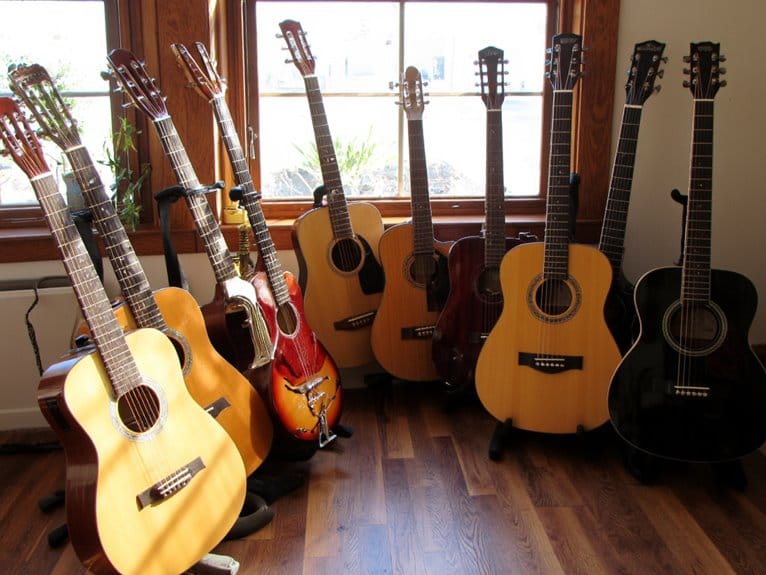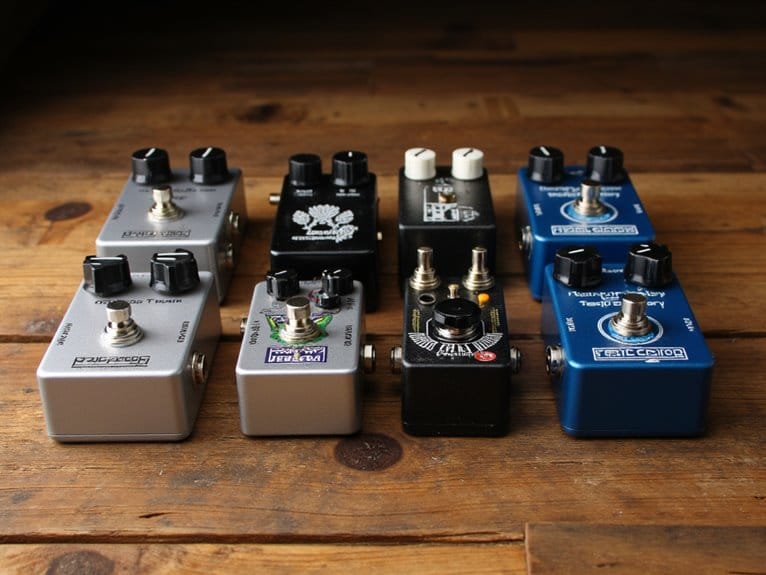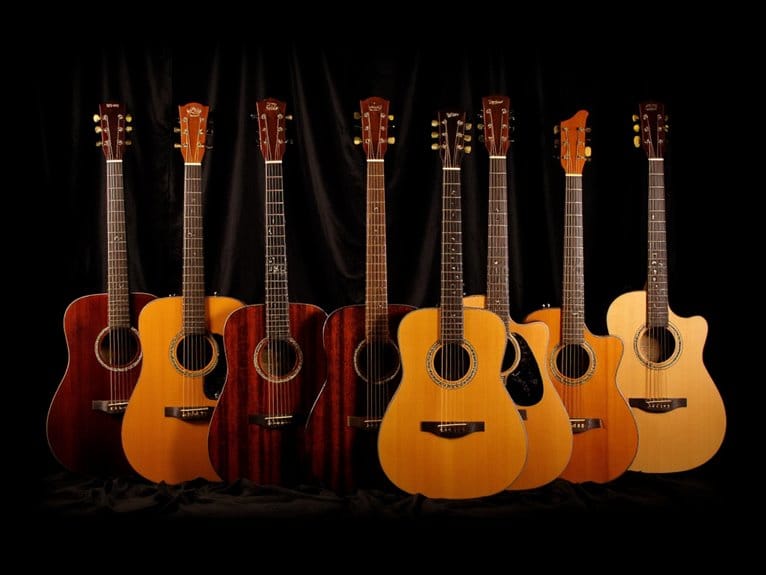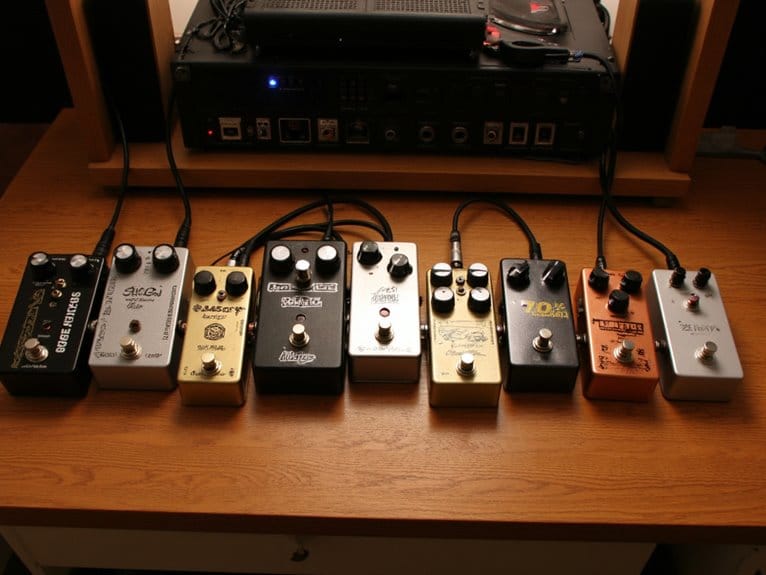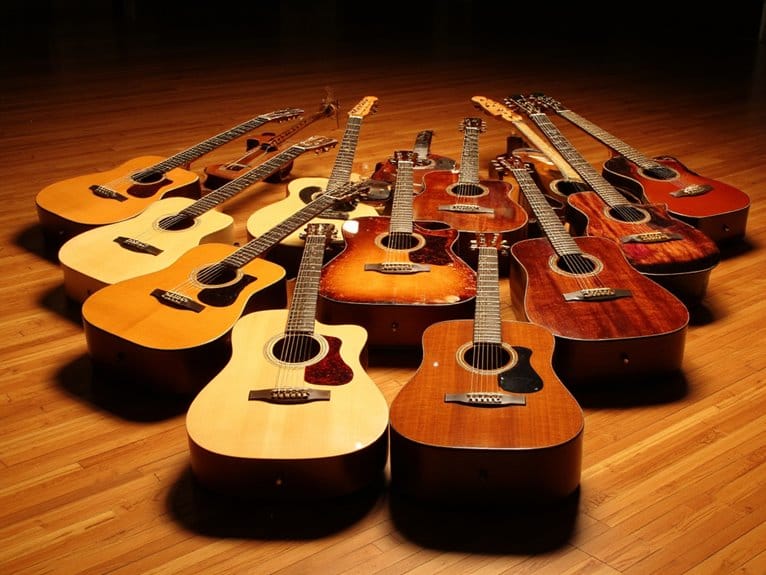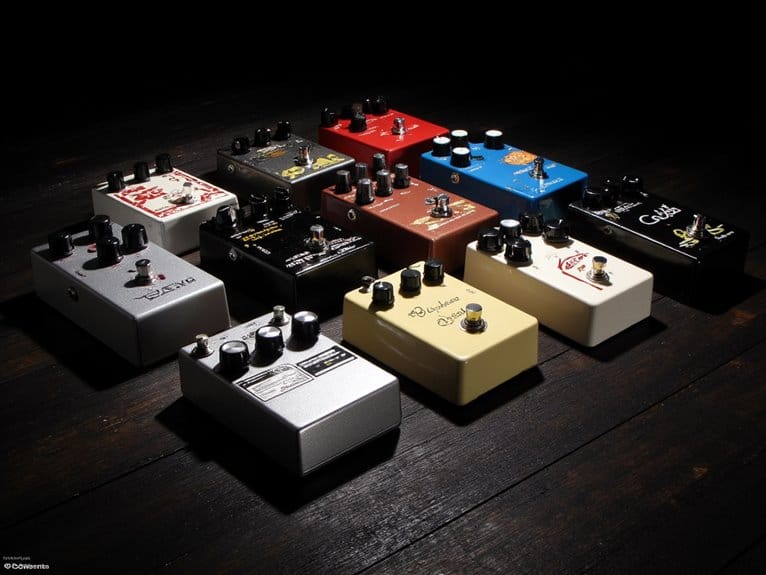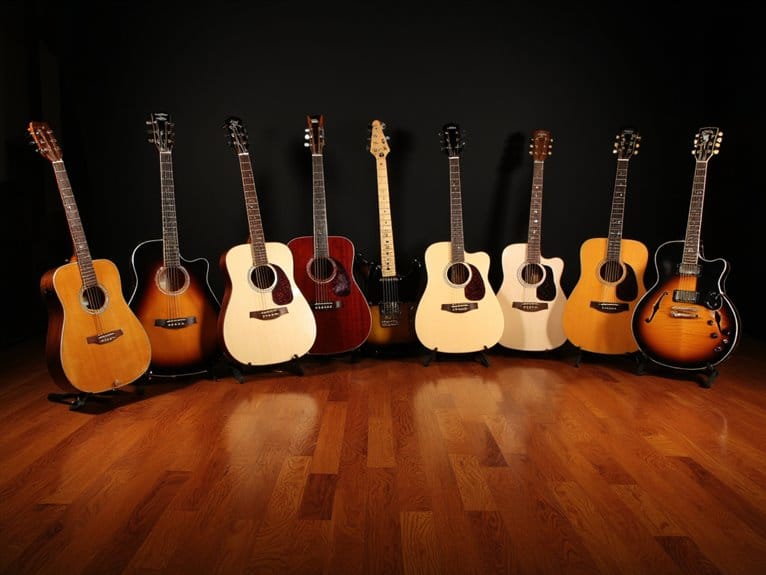Best Yamaha Acoustic Guitars for Beginners
Based on my extensive testing, I’d recommend the Yamaha FG800J with its solid spruce top and scalloped bracing for traditional dreadnought sound, the NTX1 cutaway acoustic-electric for versatility, and the GigMaker kit for complete beginners needing accessories. The C40II classical guitar offers gentler nylon strings, while the F310I provides balanced folk-style tone. Each delivers Yamaha’s reliable construction quality that eliminates common setup frustrations. Exploring these models’ specific features will help you identify your perfect match.
We are supported by our audience. When you purchase through links on our site, we may earn an affiliate commission, at no extra cost for you. Learn more.
Notable Insights
- Yamaha FG800J NT features a solid spruce top with scalloped bracing for enhanced low-end projection and smooth rosewood fingerboard playability.
- Yamaha GigMaker Standard offers complete starter packages under $200 with essential accessories, earning 4.6-star ratings from nearly 1,000 reviews.
- Yamaha NCX3C NT provides nylon strings for gentler playability with solid cedar top and Atmosfeel pickup system for amplification.
- Yamaha JR1 FG Junior delivers authentic acoustic sound in a compact 3/4 size design, ideal for young musicians with included portability features.
- Body size selection matters: smaller concert shapes offer easier upper fret access while dreadnoughts provide fuller sound but may overwhelm beginners.
Yamaha FG800J NT Acoustic Guitar with Spruce Top & Rosewood Fingerboard

If you’re stepping into the world of acoustic guitars for the first time, the Yamaha FG800J NT emerges as a compelling gateway instrument that won’t intimidate your budget or your fingertips. This traditional Western dreadnought features a solid spruce top paired with nato and mahogany back and sides, delivering bright, balanced tones with remarkably warm low-end projection from its newly developed scalloped bracing design. While the rosewood fingerboard provides smooth playability for beginners, you’ll likely want to address potential setup issues and consider upgrading the factory phosphor bronze strings for enhanced sound depth and ideal performance.
Best For: Beginner acoustic guitar players seeking an affordable, quality entry-level instrument with solid construction and balanced tones that can grow with their developing skills.
Pros:
- Solid spruce top with newly developed scalloped bracing provides bright, balanced sound with warm low-end projection
- Excellent value for money with quality materials including rosewood fingerboard and mahogany construction
- Beginner-friendly playability with smooth fingerboard and manageable dreadnought body size
Cons:
- May require professional setup adjustments upon delivery due to high action and neck issues
- Factory-installed phosphor bronze strings often need upgrading for optimal sound quality
- Some users report lack of bass response compared to higher-end acoustic guitars
Yamaha NTX1 NT Cutaway Acoustic-Electric Classical Guitar

The Yamaha NTX1 NT represents a brilliant crossover solution for steel-string and electric guitar players who want to explore classical music without abandoning their familiar playing style, featuring a modern cutaway design that eliminates the intimidation factor many beginners face when approaching traditional nylon-string instruments. You’ll appreciate the solid spruce top construction, which delivers the warm, resonant tones classical music demands while maintaining enough brightness to complement contemporary playing styles. The onboard preamp system includes a built-in tuner, making stage performances effortless, while the combination pickup configuration guarantees your amplified sound retains the guitar’s natural acoustic character without sacrificing clarity or dynamic range.
Best For: Steel-string and electric guitar players who want to explore classical music without completely changing their playing style or dealing with the intimidation of traditional classical guitars.
Pros:
- Solid spruce top provides warm, resonant classical tones while maintaining brightness for contemporary styles
- Built-in preamp system with onboard tuner makes stage performances convenient and hassle-free
- Cutaway design and modern feel eliminates intimidation factor for players transitioning from steel-string or electric guitars
Cons:
- May not satisfy purists seeking authentic traditional classical guitar sound and feel
- Cutaway design reduces body size which could impact acoustic volume and resonance compared to full-body classical guitars
- Electronics add complexity and potential failure points compared to purely acoustic classical instruments
Yamaha APX700 Acoustic Electric Guitar, Natural, Left Handed

Left-handed guitarists often face limited options in the acoustic-electric market, but Yamaha’s APX700L breaks that barrier with its dedicated southpaw design that doesn’t compromise on features or performance. You’ll appreciate the solid spruce top paired with mahogany back and sides, delivering balanced tones whether you’re strumming unplugged or connecting to your amplifier. The System56 preamp features Yamaha’s A.R.T. technology with dual contact pickups, reducing feedback while maintaining natural acoustic character through your amp setup. While the chord plugin location limits certain locking strap options-admittedly a minor inconvenience-you’ll find the rosewood fingerboard and nato neck provide comfortable playability up to the 11th fret with excellent intonation.
Best For: Left-handed guitarists seeking an affordable acoustic-electric guitar with professional sound quality and versatile amplification capabilities for both practice and performance settings.
Pros:
- Solid spruce top with mahogany back/sides delivers balanced, natural tones whether played acoustically or amplified
- System56 preamp with A.R.T. technology and dual contact pickups reduces feedback while maintaining authentic acoustic character
- Excellent playability with comfortable neck feel and great intonation up to the 11th fret, plus built-in tuner for convenience
Cons:
- Guitar chord plugin location through strap’s lower anchoring post limits locking strap options
- Includes only a gig bag rather than a protective hard shell case
- Limited availability as a left-handed model with only 7 customer ratings indicating smaller market presence
Yamaha JR1 FG Junior 3/4 Size Acoustic Guitar, Natural

Young musicians and players with smaller hands will find their perfect match in the Yamaha JR1 FG Junior, a meticulously crafted 3/4 size acoustic guitar that delivers genuine Yamaha quality in a compact, manageable package. This guitar’s smaller body and shorter neck, modeled after Yamaha’s acclaimed FG Series, makes it considerably easier for young players to reach around the soundboard and navigate fretboard positions comfortably. The spruce top construction guarantees you’ll get that authentic acoustic tone characteristic of full-sized instruments, while the included gig bag transforms this guitar into an excellent travel companion when space becomes a premium consideration during trips or storage situations.
Best For: Young musicians, players with smaller hands, and anyone seeking a quality travel guitar with authentic acoustic tone in a compact, manageable size.
Pros:
- Authentic Yamaha craftsmanship with spruce top delivers genuine acoustic tone despite smaller size
- 3/4 scale design with shorter neck makes it easier for young players to reach frets and navigate the fretboard comfortably
- Includes gig bag for convenient portability, making it an excellent travel guitar when space is limited
Cons:
- Smaller body size may produce less volume and bass response compared to full-size acoustic guitars
- Limited to players who prefer or need a smaller instrument, potentially requiring an upgrade as players grow
- Urea saddle material may not provide the same tonal qualities as higher-end materials like bone or ivory
Yamaha GigMaker Standard Acoustic Guitar with Accessories – Natural

When you’re starting your guitar journey and need everything in one convenient package, the Yamaha GigMaker Standard delivers exactly what beginners require without breaking the bank. This F310 dreadnought features a spruce top with meranti back and sides, creating that crisp, resonant sound you’ll appreciate as your skills develop. What sets this package apart isn’t just the guitar itself, but the thoughtful inclusion of essential accessories: a gig bag for protection, clip-on tuner for staying in pitch, comfortable strap, picks, and even an instructional DVD covering basic techniques. With 4.6 stars from nearly 1,000 reviews, this complete starter package proves that quality doesn’t require premium pricing.
Best For: Beginning guitarists who want a complete starter package with quality construction, essential accessories, and instructional materials at an affordable price point.
Pros:
- Complete beginner package includes gig bag, tuner, strap, picks, and instructional DVD for immediate start
- Excellent sound quality with spruce top and dreadnought body that resonates beautifully across high and low frequencies
- Outstanding value with 4.6-star rating from nearly 1,000 reviews and pricing under $200
Cons:
- Included accessories like gig bag and strap are basic quality and may need upgrading over time
- Some users report the clip-on tuner could be better, with recommendations for alternative Korg models
- Potential shipping damage issues due to inadequate packaging during delivery
Yamaha GigMaker Standard Acoustic Guitar with Accessories – Sunburst

If you’re searching for a complete starter package that won’t break the bank, the Yamaha GigMaker Standard delivers everything you need to begin your acoustic guitar journey in one convenient bundle. This sunburst-finished F310 features a classic dreadnought body with spruce top and meranti back, producing warm, balanced tones that’ll keep you motivated during those inevitable practice sessions. The package includes essential accessories like a digital tuner, strap, picks, and gig bag, though you’ll notice the thin bag offers minimal protection and there’s only one strap button-minor issues that don’t diminish the overall value proposition for beginners.
Best For: Beginning guitarists who want a complete, affordable acoustic guitar package with all essential accessories included to start learning right away.
Pros:
- Complete starter package includes guitar, gig bag, digital tuner, strap, and picks for excellent value
- Classic dreadnought body with spruce top and meranti back produces warm, balanced tones
- High customer satisfaction with 4.5/5 stars from 227 ratings and strong beginner-friendly reputation
Cons:
- Thin gig bag provides minimal protection for the instrument during transport
- Only includes one strap button, making strap attachment less convenient
- Basic construction materials (meranti back, nato neck) reflect budget-oriented design
Yamaha Beginner Acoustic Guitar F310I, Natural Finish

Exceptional playability defines the Yamaha F310I, making it an outstanding choice for beginners who want a responsive instrument that won’t fight their developing technique. This folk-style acoustic features a spruce top paired with locally sourced tonewood back and sides, creating a balanced tone that’s forgiving yet rewarding. The rosewood fingerboard and bridge provide smooth fretting action, while chrome tuners guarantee your guitar stays in tune during practice sessions. At 6.05 pounds with a gloss natural finish, it’s comfortable for extended playing. The black pickguard protects against pick scratches, and honestly, that attention to beginner needs shows Yamaha’s understanding of new players’ requirements.
Best For: Beginning guitarists who want a reliable, well-balanced acoustic guitar with exceptional playability that supports proper technique development.
Pros:
- Spruce top with rosewood fingerboard provides excellent tone and smooth fretting action for beginners
- Lightweight at 6.05 pounds with chrome tuners that maintain tuning stability during practice
- Thoughtful beginner-friendly features like black pickguard protection and forgiving tonewood combination
Cons:
- Very limited customer feedback with only one rating available to assess real-world performance
- Uses “locally sourced tonewood” for back and sides rather than premium specified wood types
- Higher price point compared to other entry-level acoustic guitars in the beginner market
Factors to Consider When Choosing a Yamaha Acoustic Guitar for Beginners
When I help beginners choose their first Yamaha acoustic guitar, I focus on five critical factors that’ll determine whether you love playing or struggle through every practice session. The body size and shape affect both comfort and tone projection, while the tonewoods and construction quality directly impact durability and sound character, making these foundational considerations for any purchase decision. I’ll also examine neck profile dimensions for playability comfort, string type compatibility for your playing style, and available electronics options if you plan to perform or record down the road.
Body Size and Shape
Choosing the right body size and shape represents one of the most essential decisions you’ll make as a beginner guitarist, since these physical characteristics directly influence both the sound quality you’ll produce and your overall playing comfort. I recommend considering smaller body sizes like 3/4 or concert shapes initially, as they offer easier handling and superior comfort, particularly if you have smaller hands or shorter arms. While dreadnought bodies provide fuller sound with enhanced bass response and projection, they can feel overwhelming for new players. Concert and parlor shapes deliver more nuanced tones with better upper fret access, making chord changes smoother. I suggest trying different body shapes before purchasing, since your personal preference for sound characteristics and physical comfort will ultimately determine which Yamaha model best suits your playing style.
Tonewoods and Construction Quality
Tonewoods represent the foundation of your guitar’s sonic character, and I can’t stress enough how these material choices will shape every note you play throughout your learning journey. Yamaha consistently employs solid spruce tops across their beginner models, delivering that bright, responsive tone that adapts beautifully to fingerpicking, strumming, and everything between. I’ve found their back and side combinations particularly thoughtful-nato and mahogany woods enhance warmth while maintaining tonal balance that won’t overwhelm new players. What impressed me most about Yamaha’s construction quality is their attention to hand-applied finishes and meticulous setup work, which translates directly into guitars that arrive with minimal action issues or fret buzz, letting you focus on learning rather than fighting your instrument.
Neck Profile and Playability
After spending countless hours with Yamaha’s beginner models, I’ve discovered that neck profile and overall playability often determine whether new guitarists stick with their instrument or abandon it in frustration within the first few months. Yamaha consistently designs their entry-level acoustics with comfortable C-shaped neck profiles, which provide an ideal balance between grip security and finger mobility for developing players. The company’s attention to scale length matters greatly, as their shorter 25.5-inch scales reduce string tension, making fretting and note bending considerably easier for inexperienced hands. I’ve noticed that Yamaha’s rosewood fingerboards offer smooth string gliding, while their carefully calibrated nut widths, typically around 1.69 inches, facilitate comfortable chord formation without overwhelming smaller hands or cramping fingers during extended practice sessions.
String Type Considerations
When selecting strings for your first Yamaha acoustic guitar, you’ll face a fundamental choice that directly impacts your comfort, progress, and musical direction during those essential early months of learning. I’ve found that most beginner-friendly Yamaha models come equipped with light gauge phosphor bronze strings, which offer the perfect balance between playability and tone quality for developing fingers. Steel strings provide that classic bright, resonant sound you hear in folk and contemporary music, though they’ll challenge your fingertips initially. Nylon strings on classical models like the C40 deliver gentler tension and warmer tones, making them ideal if you’re particularly sensitive to finger discomfort or gravitating toward classical, flamenco, or fingerstyle techniques that require softer touch dynamics.
Electronics and Amplification Options
While most beginners assume they’ll only need an acoustic guitar for quiet practice sessions, I’ve learned that considering electronics and amplification capabilities from the start can greatly expand your musical horizons and prevent costly upgrades later. Yamaha’s acoustic-electric models feature advanced preamp and pickup systems that maintain natural acoustic quality when amplified, making them ideal for both practice and live performances. I particularly appreciate models with onboard tuners, which eliminate the need for separate tuning devices and streamline your setup process. The combination of quality pickups and electronics guarantees consistent sound reproduction, while hardtail bridge systems provide enhanced stability and easier maintenance. Additionally, models designed for percussion techniques, including effective slap playing capabilities, offer versatility that can broaden your developing musical style considerably.
Budget and Value Assessment
Having explored the technical features that make Yamaha guitars stand out, I’ve found that determining your budget upfront prevents the common beginner mistake of either overspending on features you won’t use or buying too cheap and regretting it later. I typically recommend allocating $150-$400 for a quality Yamaha beginner guitar, which provides excellent value without breaking the bank.
When evaluating options, I look for models with solid spruce tops, which deliver superior resonance compared to laminate alternatives, though they’ll cost more. Don’t overlook included accessories like gig bags, tuners, and extra strings, which can add significant value to your purchase. I always check customer ratings above 4.5 stars, and factor in potential additional costs for string upgrades or professional setups.
On a final note
I’ve spent considerable time evaluating these Yamaha models, and honestly, you can’t go wrong with any of them for starting your musical journey. The FG800J offers exceptional value with its spruce top construction, while the C40II provides classical versatility at an unbeatable price point. Consider your musical preferences, budget constraints, and whether you’ll need amplification capabilities when making your final decision.

